THE TROUBLE WITH THE TROUBLE WITH WORDS
In 2011, I stumbled upon a refreshing new composer at the Hollywood Fringe Festival. The extraordinarily encouraging work in Gregory Nabours’ song cycle, The Trouble with Words, was thrilling. Comparable to the work of Duncan Sheik (Spring Awakening), the music, whether bouncy or haunting, incorporated innovative harmonies with unique orchestrations and certainly substantiated the 2011 Ovation Award for Original Music and Lyrics, even as Nabours’ heart-tugging melodies 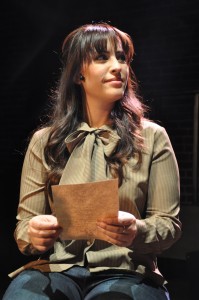 tended to float around without landing in certain songs. Almost a mash up of modern rock, the catchy rhythms of the 70s and cabaret ditties from the 80s, the collection of tunes – loosely bundled together by themes of communication and connection – elevated Cabaret-style theater to new heights. I was captivated, but also commented in my original review that Nabours’ work threatened to become commonplace lest he immediately turn to writing songs for book musicals.
tended to float around without landing in certain songs. Almost a mash up of modern rock, the catchy rhythms of the 70s and cabaret ditties from the 80s, the collection of tunes – loosely bundled together by themes of communication and connection – elevated Cabaret-style theater to new heights. I was captivated, but also commented in my original review that Nabours’ work threatened to become commonplace lest he immediately turn to writing songs for book musicals.
Why “commonplace?” While Nabours’ lyrics can be poetic, economical, funny and smart, they are also generic, clichéd and rarely sophisticated – somewhat reminiscent of the work of Steven Sater, thelyricist of Spring Awakening. Besides, bubble gum pop lyrics the likes of “Things could be better for me and you / With just a word or two” are not well-suited for the theater because they don’t tell a story. There was one song, however, that showed strength in music, lyrics and storytelling: “The Haircut,” in which a couple – Liz and Ted – have a delicious argument over his declaration that her new hairdo is “nice” and “different.”
After seeing The Trouble with Words, I truly believed that Mr. Nabours deserved praise of the highest order but I feared that he would get swallowed by the current state of theatre as a commercial commodity. I begged him to hold to his vision and start stretching his talent even further by joining a seasoned librettist and hopefully hurling American Musical Theatre into the future.
So much for begging.
Now I understand why the one-hour version I saw at the Fringe was much better-received than the 90-minute version which played concurrently at Actors Circle Theatre back in 2011. Last week, Coeurage Theatre Company remounted the song cycle at the Lost Studio for a short run and the results on opening night went from exhilarating to dispiriting in Act One to an unfortunate nose dive in Act Two.
The issues in staging these songs are two-fold. First, the songs themselves. Some are variations on a theme – single-idea songs with no melodic catch or psychological insight: “Pick-Up Lines” finds the humor in clichés used by dueling modern day lotharios and “Kid with a Heart-On” plays with double entendres, but they serve to 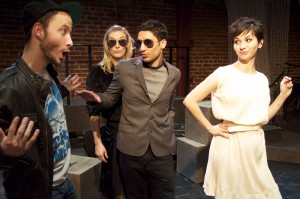 be nothing more than cute. This is fine in a piano bar, but they become tiresome in a musical, song cycle or not. Other songs meant to be inspirational can end up as philosophical babble: “Are we demons / Are we angels / Do I trust there’s a plan left unseen” from “All That’s In Between” is an example. “Raincloud” and “Before the Fall” are musically gorgeous, but the poetry-styled lyrics don’t hold a candle to the magical music. These might work great in a coffeehouse, but can be mystifying in the theater. I sure wish that the songs were more self-contained, like “Ballerina’s Lament,” which shows a William Finn potentiality as a very funny Jamie Mills grieves that bullshit is the biggest part of her life.
be nothing more than cute. This is fine in a piano bar, but they become tiresome in a musical, song cycle or not. Other songs meant to be inspirational can end up as philosophical babble: “Are we demons / Are we angels / Do I trust there’s a plan left unseen” from “All That’s In Between” is an example. “Raincloud” and “Before the Fall” are musically gorgeous, but the poetry-styled lyrics don’t hold a candle to the magical music. These might work great in a coffeehouse, but can be mystifying in the theater. I sure wish that the songs were more self-contained, like “Ballerina’s Lament,” which shows a William Finn potentiality as a very funny Jamie Mills grieves that bullshit is the biggest part of her life.
Second, because of the nature of the songs, it is the director’s task to stage them in a heightened theatrical manner that links them together, and this is where The Trouble with Words really lost its footing. Patrick Pearson opted for a cabaret/revue showcase of sorts: “Kid with a Heart-On” was staged like an actual cabaret with 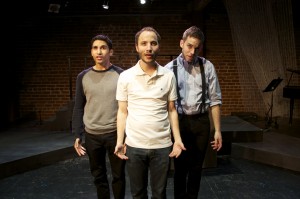 microphones; “Fool’s Gold” had an actress clad in a sparkly gold bra toying around with the musicians; and “Here We Go Again” had an actress standing just above the bass player with sounds of crashing waves, but we have no idea who or where these people are. Even Kander and Ebb’s revue, The World Goes ’˜Round, can be deadly dull, but Robert Marra succeeded with the production at Actor’s Co-op by creating a restaurant setting and wholly distinct characters first and then assigning songs appropriate to that character. Pearson utilizes the same kinds of boxes seen in revues since the 60s and while the scene changes are fantastically quick, some of the staging is so busy (“Tongue-Tied”) or odd (“Complimentary Brunch,” by turns funny and silly) that the songs lose what little meaning they have.
microphones; “Fool’s Gold” had an actress clad in a sparkly gold bra toying around with the musicians; and “Here We Go Again” had an actress standing just above the bass player with sounds of crashing waves, but we have no idea who or where these people are. Even Kander and Ebb’s revue, The World Goes ’˜Round, can be deadly dull, but Robert Marra succeeded with the production at Actor’s Co-op by creating a restaurant setting and wholly distinct characters first and then assigning songs appropriate to that character. Pearson utilizes the same kinds of boxes seen in revues since the 60s and while the scene changes are fantastically quick, some of the staging is so busy (“Tongue-Tied”) or odd (“Complimentary Brunch,” by turns funny and silly) that the songs lose what little meaning they have.
Despite these issues, I recommend this production. First-timers should appreciate some of the trappings and Couerage Theatre’s tickets are always Pay What You Want. Brian Morales, who is also on reeds, showcases his magical orchestrations utilizing percussion (Brian Cannady), guitar (David Lee), Cello/Bass (Taylor Harb) 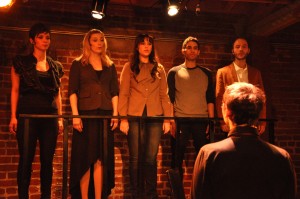 and Violin (Darryl Black). Mr. Nabours himself appears at the piano and his nimble fingerwork is something to be admired. Each ensemble member – Robert Wallace, Ryan Wagner, Christopher Roque, Julianne Donelle, Aimee Karlin and Ms. Mills – are alternatingly joyful, spirited, charming, plucky, vulnerable, sexy, tender and affectionate. They sound terrific; they blend amazingly well on the complex and dissonant harmonies (thanks to Nabours’ ever-outstanding music direction); and they groove with the grace of gazelles, showing off Janet Roston’s stimulating choreography, especially in the hot first act closer, “Sextet/Don’t Try to Go.”
and Violin (Darryl Black). Mr. Nabours himself appears at the piano and his nimble fingerwork is something to be admired. Each ensemble member – Robert Wallace, Ryan Wagner, Christopher Roque, Julianne Donelle, Aimee Karlin and Ms. Mills – are alternatingly joyful, spirited, charming, plucky, vulnerable, sexy, tender and affectionate. They sound terrific; they blend amazingly well on the complex and dissonant harmonies (thanks to Nabours’ ever-outstanding music direction); and they groove with the grace of gazelles, showing off Janet Roston’s stimulating choreography, especially in the hot first act closer, “Sextet/Don’t Try to Go.”
Even if he had a different director to showcase his material, it would still be clear that Mr. Nabours has hit the glass ceiling of his musical evolution with The Trouble with Words. It may be time, in the words of Stephen Sondheim, to “Move On.”
photos by Laura Crow
The Trouble With Words
Coeurage Theatre Company
Lost Studio, 130 S. La Brea
scheduled to end on March 31, 2013
EXTENDED through Aril 12, 2013
all seats are Pay What You Want
reserve online or call (323) 944-2165

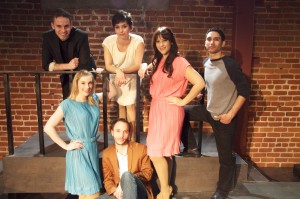

{ 1 comment… read it below or add one }
I have to disagree with Mr. Frankel. I thought Nabours’ lyrics were just as captivating as the rich and complicated music. Some of the songs (“Raincloud”, “Here We Go Again”) are largely ambiguous, but I appreciated that as an audience member, as I was free to project my own, and very personal, experiences onto those beautifully moving songs. I thought “Tongue-Tied” was one of the most lyrically sophisticated songs I’ve heard in the last decade. When shows as tired and dated as “I Love You, You’re Perfect, Now Change” keep being regurgitated in musical theatre, it is an enlightening experience to watch work as nuanced and deeply felt as Nabours’.